Those Who Walk Away from Speedrunning: A Trans Woman's Experiences Researching (and Abuse Suffered from) the Speedrunning Community
A short addendum to my 2025 Metroidvania Corpus, addressing why speedrunning—although still important to my work—is something I, a trans woman an-Com, ultimately walked away from; i.e., while keeping my interest for Metroidvania (vis-à-vis ludo-Gothic BDSM) largely intact; e.g., my abuse and alienation suffered at the hands of the shooter community versus the good treatment I received from Metroid speedrunners.
Note: Speedrunner documentarian (and charlatan) Karl Jobst has lost his trial against Billy Mitchell, and not for the reasons you might expect! Turns out, Jobst has been lying to fans for years about the court case (re: cheating at Pac-Man), which was actually about Jobst accusing Mitchell of having a hand in Apollo Legends' suicide! Basically Mitchell was suing him for that, whereupon Jobst fleeced his fans and then lied about it. And while many are shocked, I've been saying for years that Karl sucks; re: that he's fash-adjacent (a white moderate) and sex pest muckraking in bad faith. Frankly this tracks.
tl;dr - Mitchell lied about not cheating at Pac-Man (though SLAPP lawsuits certainly still suck); Jobst lied about the court case to his fans to pay for his legal expenses, essentially doing what the Completionist did, but for a dead colleague instead of a dead parent. Watch my entire response (to coverage) on YouTube. —Perse, 4/3/2025
P.S. (5/10/2025), In light of Karl being exposed in a court of law for defrauding his audience, I've looked more into his racism and other bigotries; i.e., by investigating him, but also anyone (token or not) who defends him. There's a lot of findings/persons to keep track of—e.g., "Karl Jobst Is RACIST in 2025 + Full Evidence!" and "Token Racist Who Defends Karl Jobst Is Sexist and Queerphobic, Too?"—which I've compiled into a larger compendium: "Karl Jobst: Still Racist (and Fash), in 2025." Said compendium summarizes my research and findings, but also various works by other people; i.e., those who have also investigated Karl and his friends, the entirety of our combined materials going back years (to at least 2018, but frankly further back than that if you also consider Karl's pick-up artistry from the mid-2010s and Golden Eye speedrunning days from the early '00s).
Update: 8/20/2025: No longer a WIP, "Karl Jobst: Still Racist" v1.0 has now released.
In light of recently compiling and releasing my entire Metroidvania research as one giant document (re: "Debut for Persephone's 2025 Metroidvania Corpus!"), hindsight denotes a strange and glaring omission: my exit from speedrunning research, as a whole!
As such, I wanted to quickly address how speedrunning—while still important to me and making up the bulk of my early research—gradually became less important to me, as time went on; i.e., lasting from 2017 until 2021, before abandoning "pure" game theory in favor of a more holistic practice, and one that combined ludology and games journalism with Marxism, gender studies, and Gothic praxis: Gothic (gay-anarcho) Communism (the focus of my current book series and its ongoing holistic research; re: "My Logo for Gothic (gay-anarcho) Communism!" 2023). Originally speedrunners were the center of my world, but eventually—along with academia, at large—became my Omelas to walk away from. Silence is genocide, and my desire to talk about my past isn't simply to clear the air/find closure, but document my past work as part of a larger ongoing project.
Note: This piece involves an essay that I originally wrote for Marilyn Roxie on their now-defunct blog, Video Hook-Ups: "Postcolonialism in Doom," (2020). I have decided to republish said article, here, as a matter of historical record. It will be included here, but after my written historical accounts on speedrunning.
"Rome wasn't burned in a day." While I can't speak for everyone, here, I also think it's fair to say that most people's big-life decisions aren't made in a split second—i.e., like moving away from speedrunning despite dedicating years of research to it. Doing so wasn't a decision I made lightly or at the drop of a hat; it took time, and evolved into itself from external social pressures. These partially involved my romantic escapades gradually and painfully opening my eyes to increasingly radical politics (which is what my book series ultimately became); but it also involved people I didn't personally know but worked with informing my decisions, including my decision to come out of the closet.
In a sense, that breakthrough was made after smaller-but-no-less-important rebellions, early on. As I radicalized, my work changed; as my work changed, so did my social groups and work contacts; as those changed, so did I radicalize more, etc. Metroidvania stayed a part of my coming out/future portfolio (and comprises over 25% of my PhD arguments on Gothic poetics and ludo-Gothic BDSM); speedrunning—specifically that of the shooter community—did not.
How can this be, you ask? In a nutshell, because Metroidvania were good to me, and speedrunning (especially shooters) largely weren't. And similar to my mistreatment—and gradual, boil-the-frog excommunication from academia—my alienation from the speedrunning world by its practitioners encouraged my proverbial walking away from that Omelas, too; i.e., treated like a Martian who—once exposed couldn't go back into the closet, but likewise wouldn't be accepted by token marginalized groups (the process is often called "trans emasculation")—I eventually got my ass to Mars and made friends of a similar disposition and class character. When in Rome (or on the Island of Misfit Toys, more like)…
(artist: Blur Squid Art)
To be frank, my research focus stopped leaning into speedrunning partly because of other people's abusive behavior towards me, and that includes within the larger speedrunning community itself. For a while I focused on speedrunning extensively and interviewed lots of different speedrunners. But the moment my larger politics started to seep into my work (2020, with "Postcolonialism in Doom," but also "No Girls or Trans People Allowed[1]" and my Ion Fury critique, "Zombie Police States," above, in 2021), my contacts dried up and any future interviews I had were quietly dropped. In short, I was blacklisted and segregated, and had to decide what to do next. Furthermore, this didn't just affect my videogame interviews, but also my heavy metal interviews ("two cents guy" becoming "two cents girl," which almost no one respected or stuck with); re: "My Two Cents: An Interview with Ahdy Khairat" (2019).
And while abuse certainly played a part regarding my shift in researching focus, my pause in actual interviews wasn't caused by exile, alone. While I'd been interviewing people since 2019 (re: "'Alien: Ore' (2019) Q & A Project: Interview Compendium!"), my series of interviews stopped in 2021 for several reasons. Partly I stopped because certain bad actors* in the shooter community started to reject me (re: "Hell-blazers: Doom Eternal Speedrunning Q&A, Interview Compendium!" 2020). That being said, the Metroidvania community was actually really cool about things (re: "'Mazes and Labyrinths' Q&A, Interview Compendium!" 2021), so my criticism towards shooter speedrunners/players doesn't concern them.
*"Certain" being the key word, here. Some runners, like Cynic the Original, Alecandstuff, and King Dime, were perfectly fine. Furthermore, I don't want to arbitrarily point fingers, here, but instead address how my overall treatment and circumstances made me feel (which to some degree is subjective and relative to other things that were happening in my life, at the time).
Apart from abuse, another reason I stopped was quantity. I eventually acquired the amount of research I would need to proceed writing about Metroidvania (which I gradually prioritized over shooters, during my PhD work); i.e., to embark on the book-writing side of my research. In other words, conducting these interviews was time-consuming and planning-intensive, and I didn't want to do anymore of it than I absolutely had to. Coupled with the frustrations and hang-ups that did take place, I drew a line and stuck to it.
The thing is, I wasn't actively investigating anyone for anything. I was primarily focusing on the games being played, and wrote about them because it interested me. And yet, while I wasn't consciously "doing an activism," in reality that's exactly what I was doing. Furthermore, once my views were out in plain sight, the people I had previously worked with started treating me like a threat; i.e., someone who might investigate them for things they had done/views they privately (or not so privately) held. In very Gamergate fashion, they started to treat me like a muckraker. I lost interviews not just with Richard Gobeille—whose game I had enjoyed playing (re: "'80s Popcorn Love: An Ion Fury Review," 2021) but not its in-game Read Me[2] (and who had experienced repeated scandals about his game containing sexist elements; see: footnote link)—but also Nick Newhard from Monolith Productions (whose interview was prepped and ready to go before he ghosted me) and John Romero (who initially expressed interest [through his wife] before backing off*).
*The receipts for Newhard and Romero's wife got lost in the shuffle, I'm afraid; i.e., Google recently put a cap on my data, and despite being an alumnus through my school e-mail, and in trying to free up space by mass-deleting junk mail, I accidentally deleted non-junk mail, too. This being said, I still have the Q&A I wrote for Newhard to respond to (source: "Vintage to Retro: An FPS Q & A series - Nick Newhard, June 8th, 2021). I wrote it and reached out to him after watching Civvie 11's 2019 Blood retrospective (re: "Pro Blood #1") and even trying to get an academic journal about Civvie and Blood published (re: "Survival-Horror in Blood: the Weaponized Affect of the Gothic FPS). I was not successful in the latter half, but Newhard did agree to do the interview (and wasn't above having them, given Blood's then-recent Nightdive remaster sparking fresh interest; e.g., his YouTube interview with RagnarRox: "Blood (1997) | Full Interview with Nick Newhard," 2020). Newhard accepted the Q&A, and then stopped responding after I sent him the questions—dick move!
Abuse is often unspoken, and during and after its occurrence invariably requires some degree of speculation to articulate. To that, it wasn't even that I had disagreed with these people that led to their cold shoulders, but how I did it; i.e., they were interested in being challenged in ways that didn't upset their pre-held political beliefs or prevent them from jousting in ways they deemed acceptable; e.g., YourMateDevo agreeing with me initially about Under the Mayo, only to walk back his statements the moment I rocked the boat: by critiquing id themselves, and anyone supporting them to an uncritical degree.
It was more of a careful distancing or neglect, in many of these cases (or Mayo straight up asking me to stop tagging him after critiquing his videos too many times; source tweet, Under the Mayo: March 24th, 2021). But in other cases from the same community these persons belonged, the hate was much more outspoken and pronounced; e.g., the comments to "No Girls" having some constructive moments, but many more being pointlessly aggressive, hateful and bigoted—all to defend "their" territory from my arguments (many of the commentors being anonymous, but others coming from trans people when I was still in the closet). Microaggression or flat-out aggression is still aggression, and acting indifferent during a witch hunt is, unto itself, a form of passive aggression. By extension, all of these people (white straight male gamers, by and large) wanted to advertise their own politics; i.e., through media that was worshipped in service to profit, not critically dissected and analyzed—and they certainly weren't quiet about that!
Again, it was very Gamergate, and in the absence of any kind of "smoking gun" against me (not that anyone investigating Anita Sarkeesian ever found anything substantial against her), most just iced me out/severed all ties. For them, Sarkeesian's idea was impossible; re: the completely-true-but-widely-hated idea that "it is both possible and indeed necessary to enjoy something and still critique its pernicious and problematic elements." White male fragility at work, they saw me as a threat that would expose them, advertently or not, so they acted how privileged people (namely white moderates) so often do: gradually and indirectly while the dogpile ran its course (I still get a comment every so often about that review). Worse—and something I didn't realize until I came out of closest, in August 2022—but everything that was happening to me at that point was transphobic; i.e., everything my review for Doom Eternal discussed about gender trouble was being applied to me without me knowing! The closet sucks.
(artist: Persephone van der Waard)
Left with no alternative, and feeling deeply uncomfortable with the idea of asking my former contacts why I suddenly was alien to them (I wrote to some, none replied), I started to try and understand why through my work; I shifted away from objectively analyzing speedrunners (who, to this day, are primarily white straight men) and began to see them through a dialectical-material lens: as status-quo men monetizing and monopolizing their craft to defend capital with, in some shape or form. This wasn't an immediate realization, nor restricted entirely online, but one that started as much with domestic abuse at home/postgrad work during Covid as it did with public exile; e.g., "Military Optimism" (2021), which belonged originally to a now-discontinued book whose chapter I absorbed into my Sex Positivity book series: Neoliberalism in Yesterday's Heroes.
My life was a bit of a mess when I wrote Yesterday's Heroes. For starters, my second ex had left me without warning in September 2019, going on to marry a secret flame in England. Coupled with that, I was both coming out of the closet, at the time, being dogpiled for my Doom Eternal review, and dealing with Covid/academic rejections (re: "Survival Horror"), as well as suffering the abuse of my then-third-partner while living in Florida with them (re: "Escaping Jadis; or, Running up that Hill," 2024).
In regards to all of that, Yesterday's Heroes represented several things: one, the initial articles that got me in trouble with the shooter community, but also my own digesting of Judith Butler's Gender Trouble (1993) while living with a TERF/SWERF for several years; i.e., the TERF movement was kicking off in 2017, post-Gamergate (2014), and basically my writing—going from the kind of inoffensive "I like sex, heavy metal and videogames" blog writing (re: "Sex, Metal, and Videogames," 2021) and indifferent, socially inert game studies (re: "Mazes and Labyrinths," 2021)—turned into something altogether more holistic, empathetic and politically active. At first, my de facto rivals couldn't stand it—i.e., sex was gross, unless it was sold to them and reflected the nuclear model they were currently worshipping through Doom and similar monomythic fiction—but I kept at it and here we are!
If asked, my critics might describe me as some automatic whistleblower who, in 2020, was actively gunning for them and everything they hold dear ("I'll get you, and your little dog, too!"). But in reality I was just following my nose/on the trail of things they didn't want investigated, save to aggrandize them and validate their pre-existing status-quo views (and whose nose had always been meticulous, but in which grad school had honed while reinvigorating my blog writing to lend a more critical viewpoint). In turn, I think the larger social body I was dealing with ultimately decided against my views; i.e., they pulled away because I was a "lost cause," thus wouldn't stop growing into what they said I was before I had even come out. In some ways, I was oblivious to my own queerness until suddenly I wasn't, but others with a nose for it (even bigoted bloodhounds punching down at me) spotted it much sooner. And yet, the oil-to-water treatment only pushed me to keep digging and get to the bottom of things; i.e., the criticism—but especially the nastier criticism without empathy or merit—ultimately drove me to change.
The core problem with journalism and activism lies in trying to investigate cops, de facto or otherwise; i.e., those who very much want power but don't want anyone looking into how they got it or what it stands for. So I very quickly found myself working in the dark, chasing ideas attached to a system that seemed, through the people manning its walls, to be defending itself: by simultaneously maintaining and reinforcing its boundaries, while also concealing and expanding them; re: gaslight, gatekeep, girl boss. I wouldn't tokenize, and I was too principled and meticulous to stop (or curb) what I was doing. And so they left me to my devices, wherein I continued my research on speedrunning and videogames, shaken but determined to complete things. In truth, I had survived much worse.
This brings us to my changing of opinions about speedrunning. Originally I veered away from just Doom Eternal (re: "Spectating FPS Speedruns: Potential Pitfalls Exemplified by Doom Eternal," 2021) and delved into speedrunning as a more peripheral case of study. As time went on, I barely focused on speedrunning at all—instead fixating on sex worker liberation through iconoclastic art, and using my interest in Metroidvania to develop that vis-à-vis ludo-Gothic BDSM. It wasn't a subject my old research area had much to offer an opinion on; eventually I had to draw my own conclusions. So I did, releasing my PhD in 2023 as the first in an ongoing book series called Sex Positivity (whose original, outdated manifesto I started writing in July 2022). As time went on, I gradually found myself writing more and more about speedrunning, but always in small pieces (usually once or twice per book, below).
My findings about speedrunning in particular boil down, as follows; i.e., starting after the Cold War "ended," in the early '90s, but built up to and evolving into something that took decades to prepare and materialize; re: (from my Volume One):
Power is a performance that upholds through the perception of impossible things like total control, endless enemies, ultimate strength or absolute victory through kayfabe reversals. The same goes for containment, whose paradox of total imprisonment our thesis discussed in relation to videogames as breakable; i.e., how speedrunning and spoilsport gaming attitudes normally contain tremendous invention that canonically restrict the development and execution of emergent puzzle-solving to single texts in gaming culture[3], versus applying that mentality to reconfigure larger extratextual structures; e.g., Coincident's "Doom Strategy Guide - Okuplok's Mancubus Cliff" (2023, below) treating player invention more as a hobby on par with a Rubik's cube—or hell, a human beating Tetris (1985) for the first time in its 38-year existence (aGameScout's "After 34 Years, Someone Finally Beat Tetris," 2024)—versus escaping Capitalist Realism by playing videogames (and other such experiments) in ways that resist the profit motive within the neoliberal era (with organized speedrunning arguably having started in 1990[4], just before the fall of the Soviet Union). The puzzle is ostensibly impressive, but the much-touted "progress" of solving it becomes an empty gesture insofar as liberating worker minds is concerned. Doing so has no effect on the external world unless the attitude for solving complicated puzzles through emergent gameplay is deliberately taken outside of the text. Otherwise, the hauntology (and its canceled future) are entirely self-contained:
In truth, the degree of conscious unity against grander historical-material problems can be applied to capital through rebellious worker action and ludo- Gothic-BDSM poetics across all mediums and labor forms; e.g., speedrunning, which can work (from my thesis volume) "as a communal effect for solving complex puzzles and telling Gothic ludonarratives in highly inventive ways. As we'll see moving forward, this strategy isn't just limited to videogames, but applies to any poetic endeavor during oppositional praxis"; i.e., intersectional, multilayered strategies of resistance and misdirection that strive to demonstrate there is no outside of the text, applying the imagination and effort needed to transform the world around us by any and all means necessary. To that, I think the grassroots culture and non-profit approach to speedrunning allows larger groups of people to solve immensely difficult problems collectively outside of established business practices: thwarting Capitalism Realism by weaponizing the collective ingenuity and incredible puzzle-solving power of speedrunning against the elite.
If popular videogames franchised under neoliberal Capitalism, and organized speedrunning began to form right before the end of the Cold War in 1990, then its proletarian utility (and other such revolutionary strategies overlapping within nerd culture) must do so after the end of history's cultural myopia began to thicken (source)
At first, I considered the idea of practical application; re: "if you can beat Tetris, you can develop Communism." I followed this idea with a more biting critique of gamers; re (from my Poetry Module):
Regarding videogames as a neoliberal form of dogma, from the early '80s to the end of the Cold War and beyond, you went from public entertainment devices (arcades) that had a bunch of mostly young male clients cycling through them like a pimped-out sex worker… to the 1983 Atari Crash and subsequent 1985 smash-hit success of Nintendo's Super Mario Bros. encouraging the widespread sale of videogames in the Gothic's usual haunt: among the middle class. Except this time, the elite wanted in through ways that didn't exist during the Neo-Gothic revival: televisions as personal property that could funnel in their burgeoning ideology through the disguise of (expensive and highly recursive) games.
From the early days of Space Invaders (1978), Pac-Man (1980) or Donkey Kong (1981) to Mario, then (about seven years—twelve, if you start from 1973 when the elite began their first experiments with neoliberalism in South America), the usual place of neoliberal business and indoctrination transitioned from single arcade machines to larger amounts of money (from quarters to hundreds of dollars) per customer in each household (where there is more money to be had, and seasonally at that); i.e., a Stepford Wife, purchased for paychecks, not pocket change, and ready to implement the business model into the first generation of what would become the New World Order under neoliberal Capitalism: a world of us-versus-them enforced by neoliberal, monomythic copaganda's harmful simulations of Amazonomachia to maintain the status quo at a socio-material level; re: the shadows of a new republic's man-cave walls.
In turn, the American middle class (so called "gamer culture") would gatekeep and safeguard the elite through videogames being an acclimating device to neo-feudal territories to defend in reality (outside of the game world[s] themselves) as capital starts to decay like usual. Meanwhile, the companies making these games have progressively privatized and digitized them to such a degree as to make it easier to pick the pockets of said middle class, leaving them brainwashed, broke and looking for someone to blame—all while being routinely desensitized to us-versus-them violence against a flexible scapegoat refrain; i.e., extending from some combination of open to closed space across numerous themes and genres: from "Mazes to Labyrinths," "Out of Novels and into Cinema and Metroidvania"! Any counterattack should go beyond something to reference from older works into new ones. Mine are considerable, populous and consistently sex-positive, reclaiming the likes of Castlevania and Metroid to say something iconoclastic with them (versus merely compiling them as Parish largely does; i.e., he spends a lot more time compiling all the games that simply exist instead of making thesis statements that apply to multiple games…) [source: "Modularity and Class," 2024]
In doing so, I was effectively examining the people who had bullied me in the past; i.e., the same group of people the market always privileges and protects (minus token cops), who go to bat for them (corporations), on and offstage. To summarize, as the state enters crisis, during its boom-and-bust cycle, it needs defenders. Entering the neoliberal age (of videogames), the state now had a wide group of young-to-middle-aged men it could turn against social activism: loud-and-proud Gamers™ who would defend neo-feudal regressions through the same monomythic dogma in their games, but existing between said games and the nostalgic real-world spaces of nuclear home they would defend for themselves against capital's enemies.
And while my writing was largely critiquing gamer culture at large, speedrunners effectively embody a small, myopic and self-centered subset of that. Their documentarians also speedrun games (e.g., Summoning Salt, whose "4-2: The History of Super Mario Bros.' Most Infamous Level" [2018] was the first speedrunning documentary I ever watched), and synergistically make videos monetizing their own aggrandizement; i.e., "conquering" games, and each other's records, for fortune and fame.
And while they're entirely within their rights to do whatever they want, the fact remains their emergent play has notably stayed "in-text"—i.e., solving puzzles that have no real-world application, save turning "outside the box" thinking into a business "for men" (and token parties); and marrying them to the unsavory practices of people like Caleb Hart being a transphobe and all-around bigot/piece of shit[5], or Karl Jobst hiding his own sordid past (as a practicing pickup artist and friend to Neo-Nazis[6]). Openly gay and disillusioned, I slowly then all at once found myself alone, puzzling over something I had de-romanticized.
In short, I began to muckrake, feeling a need to do so given how few people were investigating streamers, then or now (the aforementioned documentarians don't tend to investigate themselves; re: Karl Jobst). Originally Sex Positivity started as an outlet to examine TERFs and sex pests in the wider world of popular media, videogames included; i.e., gamers like Caleb and Karl being similar to those who'd bullied me/turned a blind eye during my research into gaming streamers. This isn't why I interviewed the streamers I did, at the time, but several years after dealing with them and starting my book series in earnest, my past run-ins informed my current activism being "not my first rodeo."
First, I wrote Volume Three initially on my blog before taking it down; i.e., because I wanted to hammer down the theory side of things. From there, I wrote Volume Zero, followed by three, going on four additional books: Volumes One, Two, part one; and Two, part two's Undead and Demon Modules. And now after five years (and five books), I've returned to think about the community I walked away from in hindsight; i.e., now that I'll shortly be rereleasing Volume Three, which talks about bigotry in the streaming community at large, a retrospective like this one seems incredibly salient. "My time," as they say, "has come."
To be clear, speedrunning as a whole still has value, but the primary focus of my work has long since shifted away from it in any objective, non-activist sense. Outside of Plato's cave, I now see those inside it as deliberately obtuse, making money while: the world burns, genocide happens at home and overseas, and fascism affects everyone immediately but them. I still watch speedrun sometimes (mostly Super Metroid, because that's my favorite game) but it doesn't have the same magic for me that it once did; I can enjoy it, but generally when watching people who didn't abuse me from a distance.
For example, it's been fun to watch ShinyZeni—someone I interviewed, in the past (re: "Mazes and Labyrinths: Speedrunning Metroidvania – ShinyZeni," 2021)—chase the Any% world record; i.e., even though I a) know the company he keeps (re: Oatsngoats, who has vocally apologized for Caleb Hart's bigotry in the past) and b) suspect our political beliefs are radically different, he's not obnoxious about them/doesn't antagonize me for "having cooties" (also, the crowd in the above photo demonstrates the speedrunning demographic as a whole). So, in the rare moments that I even get the urge to watch a speedrun again, I can just quietly drop into Zeni's chat, lurk for a bit and leave again. It's not a world for which I'm openly welcome, however much I want to be, so I don't fight for where I'm not wanted; i.e., I have my own friends and causes to fight for, while speedrunning as a whole still hovers in the background like the ghost warriors from Return of the Jedi (1983).
To be crystal clear about this, I don't hate general speedrunning at all, and I don't wish the larger community any harm or ill will. Indeed, I go on to write in my book series (from Volume Three): "I don't wish to discourage the enjoyment of videogames or speedrunning. Playing videogames and enjoying speedrunning is perfectly fine, but I still agree with Anita Sarkeesian and marry her idea to Jesper Juul's own theories in my own Gothic-Communist approach to proletarian praxis." To it, we just drifted apart over time, thanks to some bad actors; and those actors I will absolutely critique to my heart's desire (especially if it bothers them—if you prick a gamer bro, a fascist bleeds)!
I also don't feel sick of the enterprise at large/don't feel like James Rolfe telling Jason Voorhees "kill me" after being threatened with more Friday the 13th (1987) for the NES:
(source: Cinemassacre Clips' "AVGN: Friday the 13th (Higher Quality) Episode 12," 2005)
For me, speedrunning is like an old love that—while I still care about them—had to leave behind in favor of healthier relationships. For me, that was Metroidvania and Gothic Communism—a combination of different things versus me trying to simply fit in. I want to help people, and the only way to do that and develop Communism is through universal liberation; i.e., while being neglected and catcalled by weird canonical nerds. When dealing with people like that, you speak out, but also live your best life.
(artist: Persephone van der Waard)
Speedrunning? You can keep it and your monopolies on it; I'm the mistress of my own field, and happy right where I am. But also, I'm here and I'm queer and I'm not going anywhere!
***
As promised, here is the original piece I wrote that started all this trouble, "Postcolonialism in Doom" (2020). It wasn't as inflammatory as "No Girls or Trans People Allowed," but it did start the process—one I eventually followed to its logical conclusion:
Postcolonialism in Doom
Originally posted on Video Hook-Ups: https://videohook-ups.com/2020/02/29/post-colonialism-in-doom/
Often called "Doomguy" by fans, the hero in Doom (1993) is a marine, first and foremost. Demons have overrun the Martian lunar colony on Phobos, much in the same way the xenomorphs swarmed Hadley’s Hope in Aliens (1986). In Doom 2016, the hero actually has a name: the Doom Slayer. Unlike the Doom marine, the Slayer is essentialized, an ancient warrior dug out of the rock. Ellen Ripley was also a relic from the past, used to solve a colonial mess reoccurring in the present.
The Doom marine, from the classic 1993 box-art.
Like Ripley, the Slayer unwillingly serves a powerful, corporate employer—in his case the slippery Dr. Hayden, head of the UAC corporation. Faced with an energy crisis "the world had no answer for," Hayden has colonized Hell to harvest its energy. Who inhabits this unlucky 4th world? Demons, of course—monsters, whose only purpose is to be slain.
Of course, it's entirely possible to see the demons of 2016/2020 as an extension of their 1993 forebears: heavy metal pinatas. Smash them; have fun. However, it’s hardly the sole interpretation, even if the makers intended otherwise. It's even possible for the player to see his enemies in-game as pinatas, but for this to reflect a parallel viewpoint held by him outside of the game.
In this video at AGDQ for example, the livestreamer ByteMe pauses Doom 2016 to thank United States military members for their service. When I heard this, I found myself unable to view his words as neutral praise; an army has orders, after all. This remains true despite AGDQ being a charity fund-raiser where Doom is just another game being played to generate cash. Soldiers, or people who support them, still play Doom to revel in its slaughter and jingoistic camaraderie. It might pale against the reality of military service, but it still reflects said service through a videogame made for a larger audience. Not all members of this audience are soldiers, but those who are can revel in the game for their own reasons.
In-game collectible guitars, featured in Doom Eternal.
This includes the music. Doom was founded on a love for heavy metal, illustrated by Bobby Prince taking influence from the likes of Slayer, Metallica, and Pantera. To say that heavy metal is simply meant to be enjoyed in Prince's singular manner is a bit absurd; like the violence it sings about, music can be approached from multiple angles. To say otherwise ignores the reality of how music can be applied. The same goes for any form of media, from Pepe the Frog to Nordic Runes.
Doom is much more accessible and concrete in terms of what it reflects: military action. So is the external militaristic fervor that might insert itself into the game’s conveniently Spartan power trip. Conversely the game is something that can be enjoyed by people who aren't soldiers or hawks. I detest war and violence, but love demons, heavy metal and videogames focused on war. To consume them is not to say one enjoys war, but things about war—a bit different than saying you love soldiers and their service.
Ripley or Rambo? James Cameron only directed Aliens, but he drafted its script alongside Rambo: First Blood Part II (1985).
Take Aliens, for example. The movie was an allegory for the Vietnam war. If this allegory is entertained, this would make the xenomorphs the Vietcong: The xenomorphs resisted the colonial urges of Weyland-Yutani and their American flag-wearing colonial marines; the Vietcong were a communist threat in the eyes of the CIA, whose doomed colonies were arguably a front for shadier practices. Yet, the story in Aliens is less about the marines being good, and them simply doing their jobs. Ripley is the central character, and we're meant to root for her.
The tendency to do so is perfectly fine; Ripley's struggles are separate from the company's. This being said, it's not unwise for the audience to question their knee-jerk response to what they see—Ripley laying waste to every xenomorph in sight—and to consider how such violent imagery is applied to real people in parallel situations. The Vietnam war happened; the people in it died, but you still have to tell the story to an American audience somehow.
The same arguments apply to Doom. The marine is not "good" at all, is simply a man doing his job in an insane situation; the story takes the form of a videogame whose aim is ultimately to have fun. This means empowerment, despite colonialism often having the opposite effect. Bear in mind, the original story in Doom was incredibly basic, as were its levels. They were essentially "kill rooms"—boxes built for you and your foes, with barely enough detail to merit calling them anything else. With the advent of the Quake and Build engines, further information could be supplied, future levels starting to resemble actual places.
The "neutral" hero from Doom (2016).
Fast-forward to Doom 2016. The game openly politicized its violence, its overarching plot beating “energy crisis” over the player's head. The metaphor was also a bit Promethean, this energy being stolen from another place/greater power. Doom 2016 was smaller in scope; it focused on the brutes, fodder or army belonging to whoever owned this energy source to begin with. We never saw the mastermind behind the Trojan Horse.
Similar to Doom II (1995), Doom Eternal throws the player into a larger conflict, wherein the Earth becomes a target chosen by an ultimate threat. Totalitarian regimes invent this threat in order to justify the hero's violent actions. What is the Queen in Aliens save a rival monarch, one whose power infringes on Weyland’s, including Ripley as the company's unwilling servant? Likewise, the villain in Doom Eternal, the Kahn Makyr (a not-so-subtle nod to Genghis Kahn; in Mongolian, "khan" means "leader"), is simply a power greater than the UAC corporation. The Kahn is foreign, fantastical; and, she uses her technology to trap Humanity and lure them to their doom. With the company exposed as a tin regent, the true "ruler" must emerge, a disenchanted outsider from an older time where disputes are solved through violence: the Slayer.
In Aliens or Doom, it’s mutually-assured destruction, the colony and the natives being destroyed by an indifferent leveler. However, Doom Eternal does less to build on this premise than embellish on the universe that houses it. This lore is largely window dressing for the underlying metaphor of military conquest. Despite it being framed as good-versus-evil, the Slayer is an equal-opportunity ass-kicker. Doom Eternal literally has him fighting demons, but also angels. Traditional symbols for good and evil are equalized through ultraviolence. Unlike older "neutral" characters like Ripley or Rambo, there’s no one to rescue; just enemies to kill.
An angel from Doom Eternal.
Milton's Lucifer, falling from Heaven (fun fact: Milton popularized the term Lucifer, not the Bible).
This is another stab at neutrality. There’s still room for politics, though, and certainly room for duality. Consider the Miltonian backdrop Doom Eternal establishes. Milton's Paradise Lost (1667) also featured a great war between angels and demons. This war remained a dissident allegory for the Church of England. Writing it was an act of demonstrable sedition.
It's one thing to say that playing videogames is or isn’t political; it's quite another to say that videogames can never be political because they’re videogames. If Byzantium's infamous chariot race riots between the Blues and Greens were political, then videogames can charge different social groups to congregate and interact in political ways, too. It might not seem like it because of the modern world, and how fragmented games are as a product to be sold, versus how atomized and insulated people are as individuals. Regardless, messages can still be conveyed across different platforms to unite people of different political standings.
However, even if videogames were demonstrably neutral, neutrality is still a political stance. Just as the Slayer is part of a larger, us-versus-them conflict, those controlling him in-game or out can potentially assign him to a particular group. This assignment not only becomes a form of ownership over the game by claiming its hero as being made for a particular faction; it also fails to wholly divorce itself from people in terms of how they behave in the real world. This includes real-world activities that parallel a videogame’s own content. The game becomes something to identify with, to claim.
Eat your heart out, He-man.
Those who play Doom Eternal might argue otherwise. "It's just Gamers™ killing demons," right? And it is gamers killing demons. The Slayer calls the Doom Fortress home, a lion's den in outer space stuffed with Doom paraphernalia, including a triple-monitor gaming rig (none of which has gone unnoticed by gaming channels, online; they love that shit). He’s basically a jacked-up, digital version of the game's target audience, personifying an image of themselves resupplied in this game from older works. This may be a concept that applies to videogame heroes in general, but it feels especially meta and overt with the Slayer. Art referencing players referencing art.
Perhaps it's better for those who benefit from Doom Eternal's gregarious qualities to avoid having it stamped as a military recruiting tool, a la America's Army: Proving Grounds (2015). Even if Doom Eternal wasn't built strictly as a recruiting tool, its imagery can, at the very least, be adopted laterally for this purpose. People with similar views can arguably flock to the same banner and say it belongs to them, not unlike a national flag.
Already there’s a sense of division, wherein someone like myself who enjoys Doom feels divided from its more warlike customers. I'm against war, so politically we're already of two opposing camps going in. Doom is still being marketed to a larger, heterogenous group: the old-school shooter crowd. Not all shooters shoot things in real life, but when gamers openly support the military "slaying demons" around the globe, the door for postcolonialism gets thrown wider than the gates of hell.
Neutral, or neutralizer?
Is the sort of camaraderie Doom inspires always so bellicose? No, but the dualistic nature of what's being conveyed cannot be dispelled by saying it doesn't exist, either. And those of you who might say "Well, you just don't like Doom or heavy metal or demons" can just hush. I'm a Gothicist by trade, and adore all of these things. It also means I can’t ignore the liminality in media, or social exchanges orbiting media. It's entirely possible to enjoy the game and criticize it, because my criticisms are aimed at its potential for colonial misuse, rather than it being the only option.
This could all be a joke to the developers, selling their game to all groups within the shooter fan-base regardless of politics. However, their joke is still informed by the masculine, warlike properties of 1980s Americana told through action movies, domestic heavy metal, and the occult. It's worth noting that Slayer was anti-war, exposing its horrors through their enthusiastically macabre music. Likewise, the shock of military overreach and inevitable failure is a running trope in colonial war narratives like Aliens, whose director, like George Lucas before him, is ultimately anti-authoritarian, not anti-war. They sold "war" to tell a message, because, like a stockpile of weapons left behind, you can't simply be rid of these factors; they linger, as do the cultural attitudes tied to them as entertainment.
The smart gun was based off a Steadicam vest, worn by cameramen, and the WWII-era German machine gun, the MG-42. Cameron used the same technique in The Terminator (1984).
All of this is relayed in future pastiche, continuously reassembled and resold. Consider the design of weapons like the Star Wars blaster, or the pulse rifles used by the colonial marines: all kit-bashed real-world weapons, some more well-known than others. Movies like these, or miniseries like The Mandalorian (2019), display drama wherein the prime mover/center of attention isn’t simply the gunfighter but his boom-stick, a real-life, antiquated firearm dressed up as science fiction. And what is Doom Eternal if not a present-day example of the lone gunman, a one-man army squaring off against the enemies of Colonial Earth with a street-sweeper? It's a blast to watch, but also illustrates another curious aspect: pandering to gun violence (not sex, though; Hugo Martin explained in a recent video how they removed the boobs from id Software's first female demon for "marketing reasons"). How American.
Whatever the media, the selling of this violence is business, and always has been. It can be serious, or funny. Doom and its many-flavored sequels treat the love for violence as an entertaining part of the story—its raison-d’être. It becomes an opiate of sorts, one whose drug euphoria parallels a fatal attraction towards the troubling aspects of humanity's colonial past, but also its present. That's what the Gothic is all about. There's no shame in loving these devices with an open mind; it becomes a problem when you overlook the destructive potential of what they stand for in the world at large, and how this factors into entertainment more generally. Il n'y pas de hors-texte.
Footnotes (for "Those Who Walk Away")
[1] My Doom Eternal review, "No Girls or Trans People Allowed," really kicked the hornet's nest, and to this day remains my most infamous and divisive piece. The hate came from angry and vocal gamers essentially telling me that my love for Doom "isn't legitimate" and that they'd defend the franchise from me—in short, by attacking me as Doomguy would demons from Hell: through keyboard war (white straight nerds really don't like Judith Butler). Apart from my contacts ghosting me, I had random strangers actively stalk me, tell me I was "a faggot" and "secretly gay" for writing what I wrote, and more! "What doesn't kill you" and all that…
Update, 1/15/2025: To see my 2025 retrospective to this review—and me responding to all of the transphobic and tokenized comments after having written my PhD and coming out of the closet as a trans woman—refer to my new companion YouTube video, "Persephone's Metroidvania Series #6: Reading My Transphobic Hate Comments (re: Doom Eternal)."
[2] Which I wrote about in "'Neutral' Politics: Feminism, the Gothic, and Zombie Police States in Ion Fury" (2021):
Or as my partner calls it, "'gaslight, gatekeep, girl boss,' the game!"
[3] I.e., "gamer culture," which, as we've established in our thesis volume, is predominantly white, cis-het, and male. Moreover, many "metas" exist within manufactured competition to serve the profit motive; e.g., fighting games and professional teams of the FGC as a globalized operation across multiple countries. If you don't complete, you don't exist.
[4] As Eric Koziel writes in Speedrun Science: A Long Guide to Short Playthroughs (2019):
In March of 1990, Nintendo of America staged an event in Dallas, Texas [...] called the "Nintendo World Championships." While this was mainly a marketing event to capture and further motivate the explosive success of the NES, it grew into a full-on circuit. While the event itself was built around total score, the Nintendo World Championships have a place in history as one of the earliest instances of organized speedrunning (source).
[5] E.g., Caleb Hart attacking the trans community in 2019
"I don't have an issue with GDQ putting on this type of event, but I have issues with the 'attendance.' If truly all the people attending were indeed females, great. But that won't be the case" (source tweet: Dagnel RGT, 2019).
being racist
(source: Big Jeffery's "Speedrunner CalebHart42 Banned from Twitch for Racism," 2019)
and pressuring a girl he got pregnant to have an abortion.
Specifically Caleb coerced a former sex partner—Barbie Edge—into having unprotected sex with him (after saying "I'm not a rapist" to her), vampirically gaslit her, then had his parents coerce her into terminating her pregnancy (source: Barbie Edge's 2020 tweet sharing the link to her story about Caleb on Google Docs). This behavior is public record and Caleb has never addressed it at all, let alone in any meaningful sense (bigots are often sexual predators, and predators hate accountability for their actions); Barbie's tweet about it is still up on Twitter, as is her Google Docs testimony about his abuse:
I was since banned from his Twitch chat in 2024 for commenting during a FF7 remake speedrun that Tifa was being sex-trafficked—not for endorsing it, but for pointing it out. So yeah, Oats, people can change, but Caleb never has because he's a grifter privileged by the system who exploits his audience for content (we'll back to him when I release my final Sex Positivity book volume).
[6] Karl is a wonderful detective and awful person/non-existent activist; i.e., it's possible to be both and simply boils down to what he detects and why. In his case, he investigates frauds in the gaming community at large, and legitimately scummy people doing shitty things, but does so to run from and disguise his own shitty past and currently sexist/racist behaviors; i.e., he's a white moderate, which is really just a Nazi in-disguise; re (from the Poetry Module):
The boy-gets-girl formula is as old as the monomyth, but translates from D&D into videogames via the usual imperial language of sex and force—from Donkey Kong (where the hero, Jump Man, is actually the villain) to Jump King (2019), where it (and content [not criticism] about it; e.g., Karl Jobst's "Jump King's Biggest Barrier Was Finally Broken!" 2024) is suitably less ironic or critical of the media circuit it contributes towards. Instead, the developers (and speedrunning symbiosis) bank on the sexist headspace of Earthworm Jim (1994) or Dragon's Lair (1983) to valorize male action; i.e., to conquer Hell as a place to enter then oust false dark kings or monstrous-feminine beings to restore balance to the "natural order" of things: by alienating and fetishizing nature as something to conquer by virtue of traditional male action (force) under Cartesian thought. It's unironically something that wins the princess as a prize (who apparently is just lying in wait, dressed up like a bimbo* waiting to be taken back to the hero's bed to be "lanced").
*There's nothing wrong with slutty outfits; there's everything wrong when female/GNC agency is removed to choose outfits that cater to the Male Gaze (as classically white, cis-het) to serve profit like usual (re: Persephone van der Waard's "Borrowed Robes: The Role of 'Chosen' Clothing — Part 1: Female Videogame Characters," 2019). This does nothing at a systemic level but engender class dormancy and betrayal from the usual breeding grounds for fascism: the middle class, but especially the male middle class as having bought into the quest for mastery as literally "the quickest, straight-line path to sex by reducing nature to trad-wife slut (the virgin and the whore) and biologically essential/female." It's so gross!
(artist: Timbo the Champ)
In-game, Jump King literally calls said prize "Smoking Hot Babe"—ostensibly no different than Earth Worm Jim's "Princess What's-Her-Name?" except it's worse because the princess, this time around, is actually a princess and not a cow in a princess suit. This canonical prostitution doesn't stay "in-text," but reflects in how Karl Jobst (re: a man with former fascist ties, as well as being an honest-to-god pickup artist* in the not-too-distant past) valorizes raw manly execution to get to the titular babe as fast as humanly possible. It's a game for straw dogs, investing so much energy at a hamster wheel that, in the same breath, is gentrifying the practice around heteronormative/monomythic gaming tropes. Simply put, it's regressive and capitalistic, not satire, because it does absolutely nothing to meaningfully challenge capital—all while actively reducing its target audience to rats in a race chasing the same-old prizes (clones not just of Princess Toadstool, but Princess Peach made extra effusive, sleazy and demure not unlike Arnold's dream girl in Total Recall… minus the satire), then making them king for a day!
Like Total Recall (the director of that movie loving to critique American culture, but especially power fantasies), the procedure isn't just lobotomizing but a gold rush (and people like Jobst—the one's selling the shovels—stand to make a lot of money for themselves). It's why the kids from Stranger Things both unironically treat Sadie Sink like a piece of meat and support Israeli. It all connects because capital relies on dogma as something to internalize and serve profit on all registers—on and offstage, at home and abroad, by white male predators.
*From r/speedrun: The drama starts in 2021, when a person known as Tomato Anus (we're off to a great start, I see) severed ties with Karl due to some company Karl kept; i.e., a Neo-Nazi named RWhiteGoose. There's a lot of messages going back years regarding the server Goose was on, but those are from someone who's own testimony isn't the most reliable (a fash). Take a look at them if you want and decide for yourself what to think (Karl was friends with this person for years/frequented the server with other like-minded people). There's also Karl's explaining away of his own racist language (the following quote is from Emtech1, on Reddit):
The reason why I struggle to see Karl as a decent person is that some people would bring up their concerns afterwards and Karl would outright lie about the N word having any negative connotations in Australia. I'm Australian too, and this is absolutely not true. Karl is from Queensland by the way which is why that image references several places in that state that used to have or still have the N word in it. That word has historically been used against our natives, and a 30+ year old man, especially one who has an internet presence would know better.
Whatever you think about Goose, he has been very apologetic for the last 3 years and I think he's made a genuine effort to move in a positive direction. I believe this to be a genuine change in character, and if it isn't, I'd rather accept someone faking being a changed person than turn my back on a genuine one.
Karl on the other hand has never apologized and instead lied about it. Even worse, once on Discord he was ranting about people accusing him being racist and he brought up his Asian wife as his anti-racist shield. Do I need to mention that Derek Chauvin had an Asian wife? It's really beyond me that the community continues to ignore this guy's behavior.
EDIT: Here's some more receipts of him justifying using the N word, bragging about sleeping with many women, his past of being a pickup artist, him bragging about his "massive cock" and wanting breast implants for his wife. He named his son "Maximus Wong." I seriously can't not think this is related to his penis/eggplant obsession.
Apart from all of that, though (which honestly is bad enough), I think the pickup video is the biggest red flag because it's obviously Karl. Like, he made it and it's garden-variety sleazy in all the worst, most stereotypical ways. Combine that with his crusader veneer and it doesn't take long for it all to fall apart (fash disguises generally aren't very good; they just surround themselves with people as scummy as they are).
I've seen the video* and honestly it tracks rather well with Karl's current streamlined (and slightly sanitized-but-still-sexist) approach to games; i.e., he—per the pickup artist approach—treats woman like games: as objectives, things to observe, learn and manipulate in a mechanical, knee-jerk fashion that can then be conquered. And of course, he capitalizes on it as a "free" scheme for which the video-in-question advertises his own book based on "beginner stuff" and having a stripper silhouette on the cover (real classy, dude)—"First one's free," in other words. I found it to be really odd, because he kept saying in the video, "Final step, get the hell out of there!" And I'm like, "Dude, that's bad-faith. But two, why break the ice if you're just gonna fuck off each and every time? That's conditioning bad habits!" Maybe don't take dating advice from a white supremacist who spent his teenage years and twenties speedrunning Goldeneye (1997)? Dude unironically thinks he's James Bond or some shit.
[*I recorded a full response to Jobst's pick-up artist video, breaking it down and critiquing his bad advice and grifter behavior: "Persephone's Metroidvania Series #5" (2025).]
More to the point, a relationship isn't to perfect mechanical actions/routes like Jobst explains, thereby bouncing when things inevitably get rough/complicated; it's to be flexible with someone that you want to relate to on an interpersonal level as equals. Your partner isn't an adversary to conquer but a peer to treat as human. So Karl's advice is actually terrible for dating reasons, too, because that's not what it's about; for him (and all pickup artists), it's purely a "headcount" to pile up and use to brag about with other white, cis-het guys. It's terribly cliché but also cruel. Also, again, his son's name is apparently Maximus Wong? I can't verify that, but I've seen the Maximus shirt, so at least half of that is true. Like, what the fuck, dude? People like him make the world in their image: through genocide and vanity projects at the expense of nature-as-monstrous-feminine. That's how white supremacists work; i.e., what Andrew Tate calls "a genetic legacy" while in the same breath making an old sodomy argument that reduces sexuality to action: having sex for reasons other than sexual reproduction is "gay" (The Kavernacle's "Andrew Tate and Conservative Men now say it is GAY to Like Women," 2024). They think they're oh-so-slick, but really they're just gaming a system that's made for them to do so. So congratulations, Karl, you are playing life on easy mode! (source: "Modularity and Class").
About the Author
Persephone van der Waard is the author of the multi-volume, non-profit book series, Sex Positivity—its art director, sole invigilator, illustrator and primary editor (the other co-writer/co-editor being Bay Ryan). Persephone has her independent PhD in Gothic poetics and ludo-Gothic BDSM (focusing partially on Metroidvania), and is a MtF trans woman, Tolkien and Amazon enthusiast, anti-fascist, atheist/Satanist, poly/pan kinkster, erotic artist/pornographer and anarcho-Communist with multiple partners. Including multiple playmates/friends and collaborators, Persephone and her many muses work/play together on Sex Positivity and on her artwork at large as a sex-positive force. That being said, she still occasionally writes reviews, Gothic analyses, and interviews for fun on her old blog (and makes YouTube videos talking about politics). To learn more about Persephone's academic/activist work and larger portfolio, go to her About the Author page. Any money Persephone earns through commissions or donations goes towards helping sex workers through the Sex Positivity project; i.e., by paying costs and funding shoots, therefore raising awareness. She takes payment on PayPal, Patreon, and CashApp, etc; all links are available on her Linktr.ee. Every bit helps!
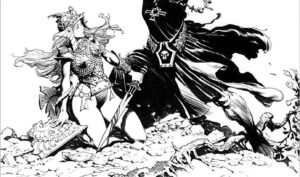

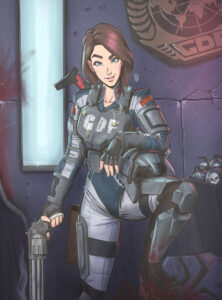


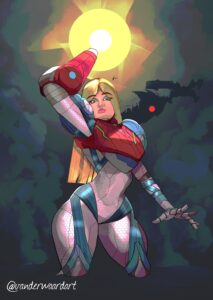












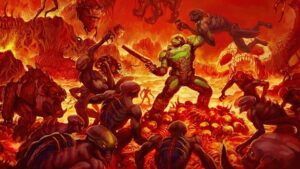


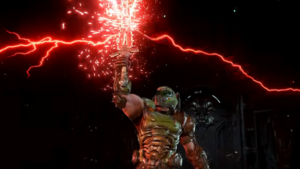


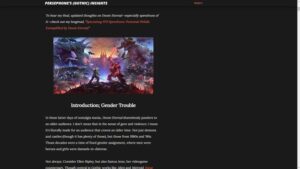


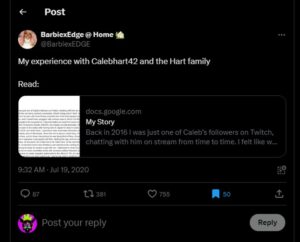



Comments
Post a Comment